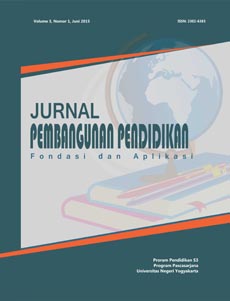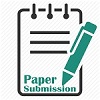Pendidikan Indonesia dalam menghadapi era 4.0
DOI:
https://doi.org/10.21831/jppfa.v10i1.29347Keywords:
Kurikulum era 4.0, pendidikan era 4.0, peran guru, revolusi industri, 4.0 era curriculum, education era 4.0, teacher role, industrial revolutionAbstract
Revolusi merupakan perubahan yang ditimbulkan oleh aktivitas manusia dalam menjalankan tuntutan kebutuhan kehidupan. Proses aktivitas ini mempengaruhi sistem pendidikan yang akan dijalankan, pendidikan harus mampu membekali peserta didik dengan keterampilan mencari, menyimpulkan, menyampaikan serta tata cara menggunakan informasi dan teknologi. Era Revolusi Industri 4.0 membawa tuntutan tersendiri bagi dunia pendidikan, lembaga pendidikan harus mempersiapkan literasi dan orientasi baru dalam bidang pendidikan, literasi baru itu sendiri berupa literasi data, teknologi dan sumber daya manusia. Rumusan masalah dalam artikel adalah bagaimana pendidikan dan peran guru era revolusi industri 4.0, dengan menggunakan library research. Pendidikan era revolusi industri 4.0 dengan meningkatkan kemampuan dan keterampilan sumber daya manusia, adaptasi dan pembaharuan dalam komponen pendidikan, peningkatan kompetensi dan keterampilan pendidik dengan keterlibatan teknologi pada proses pembelajaran. Kurikulum harus mampu melengkapi kemampuan peserta didik yang dapat berkontribusi secara langsung di masyarakat, mengarah dan membentuk siswa yang siap menghadapi era revolusi industri dengan penekanan pada bidang Science, Technology, Engineering, dan Mathematics (STEM). Reorientasi pengembangan kurikulum yang mengacu pada pembelajaran berbasis TIK, internet of things, big data dan komputerisasi untuk menghasilkan lulusan yang mampu bersaing di era global. Sekolah dan pendidik dalam memutuskan bagaimana pendidikan dan pembelajaran diselenggarakan, guru harus memiliki softskill yang kuat dan menciptakan pembelajaran yang berpusat pada siswa (student centered learning), pembelajaran yang kolaboratif (collaborative learning), pembelajaran penuh makna, dan pembelajaran yang terintegrasi dengan nilai-nilai luhur di kehidupan sehari-hari.
Abstract
Revolution is a change caused by human activities in carrying out the demands of life's needs. The process of this activity affects the education system will be run. Education must be able to equip the student with the skills to find, conclude, deliver, and procedures for the use of information and technology. The Industrial Revolution Era 4.0 brings its demands for education, and educational institutions must prepare new literacy and orientation in education. The new literacy is in the form of data literacy, technology, and human resources. The problem of the article is how education and the teacher's role during the industrial revolution 4.0, using a research library. Education of the industrial revolution era 4.0 by increasing the ability and skills of human resources, adaptation, and renewal in the education component, increasing the competence and skills of educators with the involvement of technology in the learning process. The curriculum should complement the ability of students who can contribute directly to society and lead and shape students ready to face the industrial revolution era with an emphasis on the fields of Science, Technology, Engineering, and Mathematics (STEM). Reorienting curriculum development that refers to ICT-based learning, the internet of things, big data, and computerization to produce graduates who can compete in the global era. In deciding how education and organized learning, schools and educators must have strong, soft skills and student-centered learning, Collaborative Learning, Meaningful learning, and integration with society.
References
Arikunto, S. (2010). Prosedur penelitian: Suatu pendekatan praktik. Rineka Cipta.
Brown, M., Conole, G., & Beblaví½, M. (2019). Education Outcomes Enhanced By The Use Of Digital Technology: Reimagining The School Learning Ecology. Publications Office of the European Union. https://doi.org/10.2766/965566
Frydenberg, M., & Andone, D. (2011). Learning for 21st century skills. International Conference on Information Society (i-Society 2011), 314–318. https://doi.org/10.1109/i-Society18435.2011.5978460
Halili, S. H. (2019). Technological advancements in education 4.0. The Online Journal of Distance Education and E-Learning, 7(1), 63–69. https://tojdel.net/journals/tojdel/volumes/tojdel-volume07-i01.pdf#page=70
Hani, R., & Richardus, E. I. (2021). Guru milenial dan tantangan society 5.0 (M. Kika (ed.)). Andi.
Hartwell, R. M. (2018). The causes of the industrial revolution in England. Routledge.
Hasbullah, M. (2015). Kebijakan Pendidikan: Dalam Perspektif Teori, Aplikasi, dan Kondisi Objektif Pendidikan di Indonesia. RajaGrafindo Persada.
Hermann, M., Pentek, T., & Otto, B. (2016). Design principles for industrie 4.0 scenarios. 2016 49th Hawaii International Conference on System Sciences (HICSS), 3928–3937. https://doi.org/10.1109/HICSS.2016.488
Ismail, A., Hassan, W. A. S. W., Ahmad, F., Affan, Z., & Harun, M. I. (2020). Students' readiness in facing industrial revolution 4.0 among students of technical teacher's education. International Journal of Scientific & Technology Research, 9(8), 300–305. https://www.ijstr.org/final-print/aug2020/Students-Readiness-In-Facing-Industrial-Revolution-40-Among-Students-Of-Technical-Teachers-Education.pdf
King, F. J., Goodson, L., & Rohani, F. (2010). Higher order thinking skills. Educational Services Program. https://informationtips.files.wordpress.com/2016/02/higher-order-thinking-skills_.pdf
Lubis, M. (2020). Peran guru pada era pendidikan 4.0. EDUKA : Jurnal Pendidikan, Hukum, Dan Bisnis, 4(2), 68–73. https://doi.org/10.32493/eduka.v4i2.4264
Moleong, L. J. (2017). Metodologi penelitian kualitatif. Remaja Rosdakarya.
Nurkholis, M. A., & Badawi, B. (2019). Profesionalisme guru di era revolusi industri 4.0. Prosiding Seminar Nasional Pendidikan Program Pascasarjana Universitas PGRI Palembang, 491–498. https://core.ac.uk/download/pdf/322573766.pdf
Peters, M. A. (2017). Technological unemployment: Educating for the fourth industrial revolution. Educational Philosophy and Theory, 49(1), 1–6. https://doi.org/10.1080/00131857.2016.1177412
Prasetyo, B., & Umi, T. (2018). Revolusi industri 4.0 dan tantangan perubahan sosial. IPTEK Journal of Proceedings Series, 5, 22–27. https://doi.org/10.12962/j23546026.y2018i5.4417
Prasetyo, H., & Sutopo, W. (2018). Industri 4.0: Telaah klasifikasi aspek dan arah perkembangan riset. J@ti Undip : Jurnal Teknik Industri, 13(1), 17–26. https://doi.org/10.14710/jati.13.1.17-26
Puncreobutr, V. (2016). Education 4.0: New challenge of learning. Journal of Humanities and Social Sciences, 2(2), 92–97. https://www.semanticscholar.org/paper/Education-4.0%3A-New-Challenge-of-Learning-Puncreobutr/9da555cb83b2f00ea7931e5a6c38953d836f19da
Ravasoo, A. (2014). Interaction of bursts in exponentially graded materials characterized by parametric plots. Wave Motion, 51(5), 758–767. https://doi.org/10.1016/j.wavemoti.2014.01.006
Reksoatmodjo, T. N. (2010). Pengembangan kurikulum pendidikan teknologi dan kejuruan. Refika Aditama.
Stearns, P. N. (2018). The industrial revolution in world history: Fourth edition. Routledge.
Sugiarto, S. (2019). Kesiapan kepala madrasah aliyah swastra menyelengarakan pendidikan pada era revolusi industri 4.0 di Kabupaten Sumbawa Besar. Jurnal Kependidikan, 4(1), 37–45. http://www.e-journallppmunsa.ac.id/index.php/kependidikan/article/view/14
Susanti, E., Rifa'atul Maulidah, & Yanti Sofi Makiyah. (2019). Peran guru fisika di era revolusi industri 4.0. Diffraction : Journal for Physics Education and Applied Physics, 1(1), 48–52. https://doi.org/10.37058/diffraction.v1i1.810
Teo, P. (2019). Teaching for the 21st century: A case for dialogic pedagogy. Learning, Culture and Social Interaction, 21, 170–178. https://doi.org/10.1016/j.lcsi.2019.03.009
Xing, B., & Marwala, T. (2018). Implications of the fourth industrial age on higher education. Tạp Chí Nghiíªn Cứu Dí¢n Tá»™c, 73(23), 10–15. https://doi.org/10.25073/0866-773X/87
Yuliati, Y., & Saputra, D. S. (2019). Pembelajaran sains di era revolusi industri 4.0. Jurnal Cakrawala Pendas, 5(2), 167–171. https://doi.org/10.31949/jcp.v5i2.1389
Downloads
Published
How to Cite
Issue
Section
Citation Check
License
The Authors submitting a manuscript do so on the understanding that if accepted for publication, copyright publishing of the article shall be assigned to Jurnal Pembangunan Pendidikan: Fondasi dan Aplikasi
 | Jurnal Pembangunan Pendidikan: Fondasi dan Aplikasi by https://journal.uny.ac.id/index.php/jppfa is licensed under a Creative Commons Attribution-ShareAlike 4.0 International License. |













